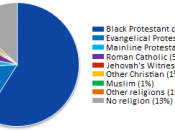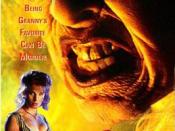It is well known from historical account , novels, poems that blacks have been abused, neglected, and mistreated in American society. In addition, a great deal has been written about the lives, hardships, and obstacle of black men, black women. Bambara presents a very descriptive picture of what life was like for blacks in the 1960. "Blues Ain't No Mockin Bird" portrays a chronicle civil rights setting movement which seeks to improve the quality of black's lives.
Granny is making the cakes on the back porch. Cathy, Tyrone and Terry are playing ardently at a frozen puddle suddenly they are interrupted by the camera men's presence. The cameramen haughtily film Granny's property without asking her permission to do so " We thought we 'd get a shot or two of the house and every thing and then" (line 8, P893). Like the vagabonds, the camera men go to Granny back yard and filming and speaking in a contemptible way " Smilin man got his note book out and chewd-up pencil.
listen he said movin back into our yard, we like to have a statement from you... for the film. we're filmin for the county, see. Part of the food stamp campaign. You know about the food stamps?" (line 19, P894). The camera men obviously insulting and think little of Granny. In spite of this, Granny is very affable with the camera men presence. She greets the camera men friendly but cautiously " Good morning, Granny cut him off and smile that smile" (line 10, P893). Granny is not very happy with the camera men and she wants them to know that she is the owner of her house. She does not want them to film her yard "I do indeed, said Granny with no smile" (line 16, P894) . The camera men are very rude they just keep go on filming and Granny finally just leave them alone "Granny said nuthin". Just like Granny, Granddaddy Cain is coming home and he does not even care about the camera men presence "he passes the porch and stops a second for Granny to see he 's caught the hawk at last"(line 38, P895). However, Granny alerts him that the camera men are invading their property and she wants him to get them out of her place "Get them persons out of my flower bed, Mister Cain, say Granny moanin real low like a funeral" ( line 39, P 896). The appearance of the male hawk plays a significant rule "The camera men are ducking and bending and running and falling" while Granddaddy Cain "stood straight up and silence , watchin the cicles of the hawk, then aimin the hammer off his wrist. The giant bird fallin" (line 42, P896). The camera men cowardly asking for their camera back form Granddaddy Cain "Can I have my camera back, please sir" (line 46, P 897). Nevertheless, Granddaddy Cain destroys the film and the camera men leaves the place with humiliations "the two men look at him, then at each other, and then just back off " (line 50, P 897). Granny is happy and continue baking her cake after the camera men left "And she was doing the cake again" (line 51, P 897).
Granny and Granddaddy Cain have a harmonious , cooperative relationship. Granny is feeling threatened by outsiders, two men who claim to have been sent by the county to make a film about the food stamp program. Granddaddy Cain responds to her outrage and forces the men to leave the property. the old couples's granddaughter, and young neighbors all witness, and learn from the interaction. The story "Blue ain't No mockin Bird" has a special African American street dialect. It is a story that using rural southern tone and language that unconsciously convey a distinct sense of the place and atmosphere in Granny's family. Obviously, there are no standard grammar English. The African American characters is concise and expressive, from the narrator's description of a "tall man with a huge camera lassoed to his shoulder ... buzzin our way," to the screeching hawk "reckless with crazy," to Granny about to "bust through that screen with somethin in her hand and muder on her mind." But most importantly, their speech is true to who they are, and even when they are threatened by the presumably white strangers, the charector's voices do not vacillate; they do not alter their speech to make it seem more dignified or formal. The two filmmakers are the only people who change their speech patterns. When they first are called upon to explain their presence, they say " We 're filmin for the county" but after they are challenged by Granddaddy Cain , they say " We filming for the county". They change their way of communication to try to reach Granddaddy Cain by using what they perceive to be his own language. It is interesting that Granddaddy and Granny communicate primary through no language. Granny indicates her great displeasure with the film makers by the sounds she makes, such as moans and hums. Without even looking at Granny, Granddaddy knows simply from her " low groanin music". The film makers, on the other hand, are insensitive to this careful and intuitive transmission of feelings, and continue to try to smile and talk their way past the family's hostility until Granddaddy Cain 's quiet dissection of their camera makes their maneuvering pointless. The filmmakers are at least able to recognize the didnity and self-assurance of Granddaddy Cain, even asking politely for the return of the camera with the words "Please, sir." "Blues Ain't No Mocking Bird" provides the courage to impose bold changes. The grand parents provide the children with models of African Americans who demand to be treated with respect. Even though Granny, by her self can not induce the intruder to leave, she continues to show her displeasure at their presence and does manage to get them to move some distance away. More over, she has a history of educating the children in the sort of behavior that command respect. Granddaddy Cain fulfill his role as the competent protector, and keeping with his duty, he demands and receives respect from the outsider and specifically the camera me.
Although Granny and Granddaddy Cain experienced a psychological conflict with the camera men, they are successful winning the conflict. Their life are in a world that is not always welcoming, they conquer the bullies. "Blue Ain't No mocking Bird " indeed shows a positive future for African Americans and in the drive to the civil right movements.
.





